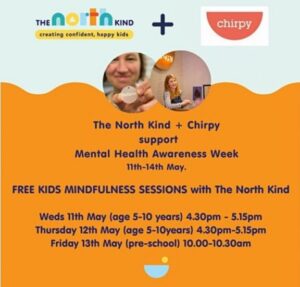Science!
This term in science we are learning all about plants. We planted some seeds in a plastic bag 2 weeks ago. This enabled us to be able to seed the roots emerge from the seed and then later see the shot appear. We have been fascinated to watch our seeds grow over time. It has also really helped us learn our vocabulary for this topic!


Today, it was time to plant our seeds into pots so they can grow even taller! We had a great time potting our plants and gave them a good water at the end.




Homework this week
As part of the homework sheet this week I have attached a sheet of phase 5 graphemes. It is really important that your child learns this really well. They should be able to say the sound the grapheme makes and then read some of the example words.
For example, ay makes an /ai/ sound in the word play.
Knowing these sounds will enable your child to read words and books much more fluently.
Thanks for your support.
Skipping festival
We are working hard on our skipping skills, that we learnt with Jodi from Skipping School, ready for the Year 2 Skipping Festival that is coming up after half term (Thursday 9 June).


We are very much looking forward to cheering on our friends, watching some great skipping skills and most of all having FUN.
All children will need to bring a packed lunch to eat on our return to school. They should also bring a fruit snack and full water bottle to take with them to the festival.
Please return the permission slip and the photograph permission form to school by Friday 27th May 2022.
Don’t forget that skipping ropes can be purchased from the office at a subsidised cost of £3 for your child to practise these skills at home.
Brownlee Triathlon
This week, some of our Key Stage 2 children took part in the Brownlee Triathlon. Sadly, this was minus the swimming as the event was running behind due to the wet weather earlier in the day.
‘I found the cycling easy but the running was harder.’ Olivia
‘I found it all really fun.’ Kian
‘I wish I hadn’t sprinted at the beginning because I didn’t realise there was more running!’ Christina
‘I was sad that we didn’t get to swim but still found it lots of fun!’ Edris
All the children behaved impeccably and showed great team spirit.
Thank you to the staff who took the children.
The AJ Bell World Triathlon Championship Series is returning to Leeds for a sixth time on 11-12 June and this year there is a chance for families to get involved.
Swim Bike Run Family – Saturday 11th June
For the first time, families can come and participate together. This is perfect for newcomers, with a 90m dip in the lake followed by a 400m walk/run. All for £10.00 per family and each finisher will receive the WTCS Leeds finishers medal. Adults must participate with the children (age 4 and above) and wetsuits are available to borrow at no additional cost. Enter here.
Swim Bike Run Kids – Saturday 11th June
We want to help children take their first step into our sport and this is a perfect opportunity, with a 90m dip in the lake followed by a 400m walk/run. This event is for children aged 8-14 years old and it’s £5 to enter. Each finisher will receive the WTCS Leeds finishers medal. Wetsuits are available to borrow at no additional cost. Enter here.
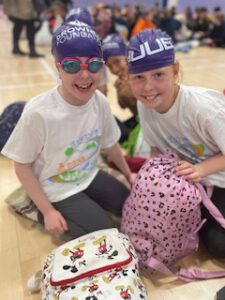





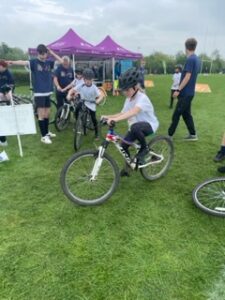






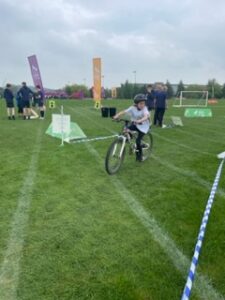

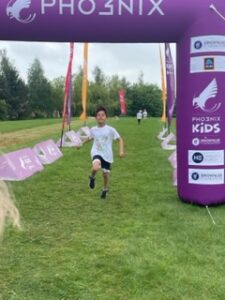





Martial Arts
Today, we enjoyed a martial arts session from Premier Martial arts.
The children were excellent throughout learning some key martial arts skills. They had great focus, listening and enthusiasm. Well done Year 2!
Please refer to the letter brought home tonight, if your child is interested in attending the club.




We are geographers!
This half-term, Year 2 are becoming geographers. As part of our Explorers topic, we’re comparing a place in the United Kingdom with a place in another country. This week, we started to compare Kenya to the United Kingdom and Nairobi to London. We focussed on the physical and human geography of these two places and noted the similarities between the two capital cities. Ask your child to tell you all about Nairobi.
As well as visiting Kenya, we have been learning about the seven continents, five oceans and about how the equator splits the earth into two hemispheres.
We have really enjoyed learning the continents and oceans by listening to and singing along to the great songs.
How can you help?
Google Earth is a brilliant tool to help develop children’s understanding of space, place, scale and interdependence. Zoom right in on your home and then zoom out to reveal the area of Leeds that you live in. Zoom further out to see what city you live. Zoom further for the county. A little further and you might start to spot some national parks. Further still and you can see the country that we live in. Keep zooming and you’ll see the continent we live in (though this isn’t labelled).
Quizzing your children about some locational knowledge will help them to remember important information.
- Which continent do we live in?
- Which country do we live in?
- In which hemisphere is our country located?
- Which county do we live in?
- Which city do we live in?
- Which part of Leeds do we live in?
- Which four countries make up the United Kingdom?
Junior Leadership Team
Congratulations to our newly elected Junior Leadership Team representatives and well done to all the children who took part. The speeches were amazing!


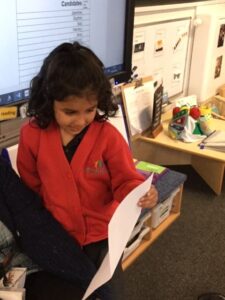

This week we will be learning about different habitats and reading the book, ‘Walking through the jungle’. The children will look at atlases and maps and find out about different habitats and the animals that live there.
Our caterpillars are growing fast and we are waiting for them to form a chrysalis.
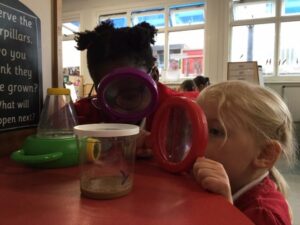

Maths
This week, the children will continue to develop their understanding of the composition of numbers to 10 using different representations. They will deepen their understanding of a ‘whole’ being made up of smaller parts through games and practical experiences, such as investigating different ways to represent 10 sausages from the counting rhyme, ‘10 Fat Sausages’. The children will also use their fingers and 10-frames to explore ‘5 and a bit’ numbers to 10. Composing and de-composing numbers involves the children investigating part–part–whole relations, e.g. seeing that 7 can be made of 5 and 2 more. Using these structures, and making links between them, will provide practical and visual experiences to further consolidate their understanding of the composition of numbers between 6 and 10.


Living and Learning: Democracy
In our second Living and Learning session this half term, we learnt all about democracy.
We learnt about the origin of the word – It combines two shorter, Latin words: ‘demos’ meaning whole citizen living within a particular city-state and ‘kratos’ meaning power or rule.
We learned that our country is a democracy because people have the power to vote and make change in the country.
We also took part in our own democratic decision: voting for our reading champion.
First we decided what makes a reading champion – someone who shares what they’ve read with others enthusiastically, someone who recommends things to read, someone who completes the tasks in their reading record and records what they’ve read and more.
After that, we held a blind vote to determine our class reading champion.
The results were counted and our winner was… AVNEET!
Thoroughly deserved winner, Avneet, had this to say to help others who might struggle with being motivated to read…
Persevere with your book – if you start it and aren’t enjoying it straight away, don’t give up. Keep on reading because you might end up absolutely loving it!
Well done everyone!
Summer term after-school clubs
Edit: places can still be booked for after-school clubs.
We have spaces available on:
Tuesday – basketball Y4-6 now open to Y3
Tuesday – rugby Y1-3 now open to reception
Thursday – multi-games Y4-6 now open to Y3
After-school clubs will be restarting next week and they will run for eight weeks until week commencing 4th July. Places can be booked via Gateway.
Our physical activity clubs continue to be heavily subsidised through the investment of our PE and Sport Premium.
Each club has a limit on the maximum number of children who can attend. As numbers are limited we ask that you limit your child to one club initially. If there are clubs with remaining places, we will then offer these as a second club.
Please contact the office if you have any queries about the clubs or the booking system.

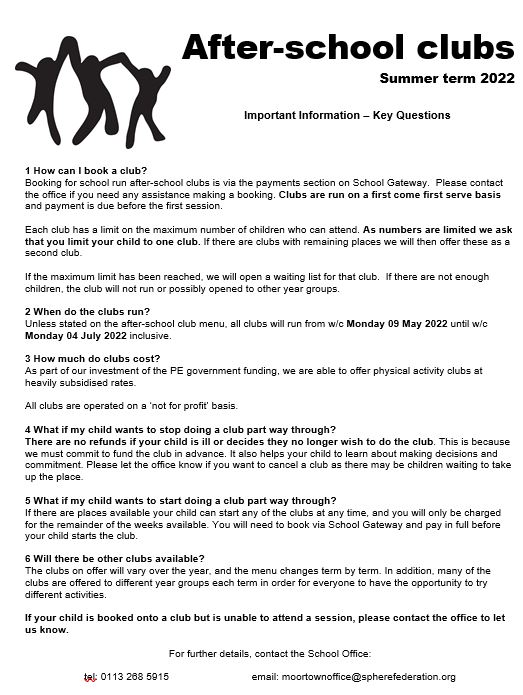
Living and learning: mindfulness
As a happy and healthy school, we encourage pupils to look after their mental health as well as their physical health. Read our mindfulness newsletter for ideas and techniques to try to support this.
As part of Mental Health Awareness Week, Chirpy, in Chapel Allerton, are hosting FREE after school Mindfulness Moments For Minis workshops. A time for children to reconnect and calm their minds.
Wednesday 11th May 4:30pm – 5:15pm Age 5-10
Thursday 12th May 4:30pm – 5:15pm Age 5-10
Friday 13th May 10am -10:30am pre school
Bookings can be made here.
By teaching mindfulness to children they learn the skills they need to build self-awareness, confidence and cope with stress. Mindfulness can help children deal with tough emotions and help them learn ways to relax and calm the mind and the body.
